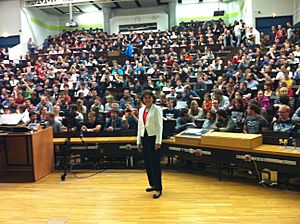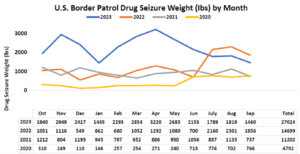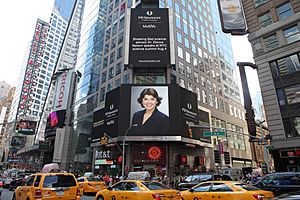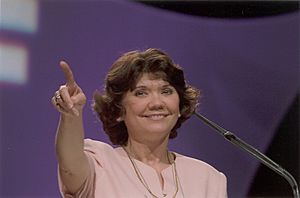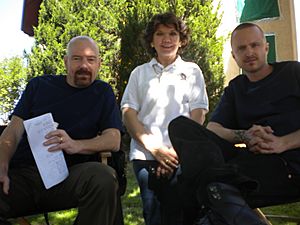Donna Nelson facts for kids
Quick facts for kids
Donna J. Nelson
|
|
|---|---|
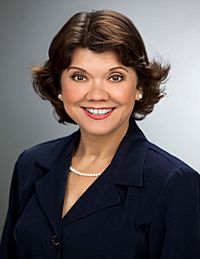 |
|
| Born | 1954 Eufaula, Oklahoma, U.S.
|
| Alma mater | University of Oklahoma (BA) University of Texas at Austin (PhD) |
| Known for | 2016 American Chemical Society President; Diversity in STEM work; Science advisor for Breaking Bad; Physical organic chemistry research; Applying NMR to SWCNT characterization; Mechanistic patterns in alkene addition reactions; Evaluating organic chemistry textbook accuracy |
| Awards | ACS Fellow (2010); Fulbright Scholar (2007); AAAS Fellow (2005); NOW Woman of Courage Award (2004); Guggenheim Fellowship (2003); Ford Fellow (2003); NSF Special Creativity Extension (1989) |
| Scientific career | |
| Fields | Chemistry |
| Institutions | University of Oklahoma |
| Doctoral advisor | Michael J. S. Dewar |
| Other academic advisors | Herbert C. Brown |
Donna J. Nelson (born 1954) is an American chemist and a professor of chemistry at the University of Oklahoma. She is an expert in organic chemistry, a field she both teaches and researches.
Dr. Nelson is famous for being the science advisor for the TV show Breaking Bad. She helped make sure the science in the show was accurate. In 2016, she was the President of the American Chemical Society (ACS), which is a huge organization for chemists.
Her work covers two main areas. The first is scientific research, where she studied how certain chemical reactions work and how to study tiny materials called single-walled carbon nanotubes. She also studied data on public health issues to help people understand them better. The second area is helping America's science community. She works to improve science education, make sure science textbooks are correct, and encourage more diversity in science fields.
Contents
Early Life and Education
Donna Nelson was born in Eufaula, Oklahoma. Her father was the only doctor in their small town. Growing up around medicine and science sparked her interest in chemistry.
She earned her first science degree in chemistry from the University of Oklahoma. She then went to the University of Texas at Austin to get her PhD in chemistry. For more experience, she worked with Herbert C. Brown, who won the Nobel Prize in Chemistry in 1979. After her studies, she returned to the University of Oklahoma to become a professor.
Career Highlights
Dr. Nelson has had a long and successful career. She was a visiting professor at the famous Massachusetts Institute of Technology (MIT) in 2003 and 2010.
In 2016, she was elected president of the American Chemical Society (ACS). The ACS is the world's largest scientific society, with over 150,000 members. As president, she worked to connect chemists from all over the world. She helped create partnerships with chemical societies in other countries, like France.
Dr. Nelson has received many awards for her work. Some of the most important ones include:
- Guggenheim Fellowship (2003)
- AAAS Fellow (2005)
- Fulbright Scholarship (2007)
- ACS Fellow (2010)
- Fellow of the Royal Society of Chemistry (2019)
- An honorary doctorate from the University of Edinburgh (2021)
Scientific Discoveries and Research
Dr. Nelson's research has made important contributions to chemistry and public health.
Studying a Public Health Danger
Dr. Nelson studied data from the Centers for Disease Control and Prevention (CDC) about a dangerous substance called fentanyl. She showed how the number of deaths from this substance grew very quickly over ten years. Her work helped show how serious the problem was.
She looked at how different groups of people were affected. This helped identify which communities needed the most help. She also organized meetings for scientists to share their research on the topic. By sharing this information, she helped warn students and the public about the risks.
Working with Carbon Nanotubes
Dr. Nelson studied tiny tubes made of carbon atoms called single-walled carbon nanotubes (SWCNTs). These tubes are thousands of times thinner than a human hair but are very strong.
She used a special technique called nuclear magnetic resonance spectroscopy (NMR) to study how these nanotubes react with other chemicals. She was one of the first scientists to use NMR in this way. Her work helped other scientists understand how to use and change these amazing materials for new technologies.
Understanding Chemical Reactions
As a physical organic chemist, Dr. Nelson studied how chemical reactions happen. She looked closely at reactions involving molecules called alkenes. She developed a new way to figure out the exact steps a reaction takes. This helped scientists understand many important reactions used to make medicines and other useful products.
Improving Science in America
Besides her own research, Dr. Nelson has worked hard to make science better for everyone.
Making Science Education Better
Dr. Nelson wanted to make learning chemistry easier for students. She looked at the textbooks used to teach organic chemistry and found that some of them had information that was out of date or confusing. She and her students pointed out these errors so that textbooks could be improved.
She also created new learning tools for her students. Two of her visual tools were so helpful that they were included with major chemistry textbooks.
Working for Diversity in Science
From 2001 to 2004, Dr. Nelson led a major study on diversity in science and engineering departments at top universities. These studies, now called the Nelson Diversity Surveys, collected data on the gender and race of professors.
The surveys showed that women and people from minority groups were often underrepresented in top science jobs. For example, one survey found no Black, Hispanic, or Native American women professors in the top 50 computer science departments. Her research was used by the U.S. government and many others to help make science fields more inclusive for everyone. For this important work, she received the "Woman of Courage" award in 2004.
Science in Hollywood
Dr. Nelson believes it is important for movies and TV shows to show science accurately.
Science Advisor for Breaking Bad
Dr. Nelson was the official science advisor for the popular TV series Breaking Bad. The show's creator, Vince Gilligan, wanted the chemistry in the show to be as real as possible. Dr. Nelson volunteered to help.
She read the scripts, corrected the science, wrote chemical equations for the props, and even helped the actors with their scientific dialogue. Thanks to her, the show became known for its scientific accuracy. Gilligan said she was a "wonderful advisor" who helped them get the science right.
Bringing Science and Hollywood Together
Dr. Nelson has worked to build bridges between scientists and the entertainment industry. She organized events at ACS meetings called "Hollywood Chemistry" and "Science on the Hollywood Screen." These events brought scientists and filmmakers together to talk about how to show science well in movies and TV.
She has also advised other productions, including the TV show The Big Bang Theory and the 2024 movie Twisters.
Images for kids
See also
 In Spanish: Donna Nelson para niños
In Spanish: Donna Nelson para niños
 | Misty Copeland |
 | Raven Wilkinson |
 | Debra Austin |
 | Aesha Ash |


